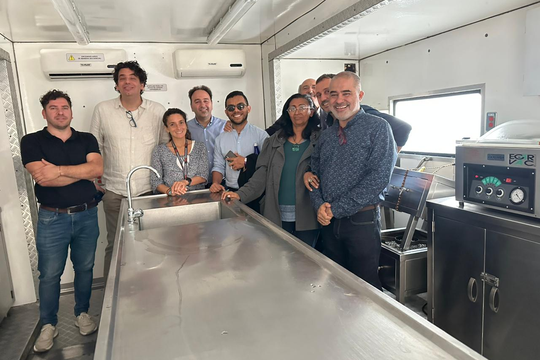The Italian delegation, composed of Prof. Dalla Rosa, Prof. Rocculi, Dr. Fantini, Dr. Molina Hernandez and Dr. Gianotti, travelled to Colombia from 28 September to 8 October to carry out the third mission in the framework of the project DRET-II (PROGRAMA DE ASISTENCIA TÉCNICA A LAS POLÍTICAS PÚBLICAS DEL SECTOR AGROPECUARIO EN COLOMBIA).
The objectives of the mission were:
To conduct seminars for a wide audience at the Bioexpo fair, both at the event in Cucuta (29 September) and the last one in Bucaramanga (5, 6 and 7 October);
The organisation of seminars for professors and students of the University of Antioquia (UdeA) in Medellin;
The main theme of the Bioexpo fair was "negocios verdes" or economic activities that generate positive environmental impacts and adopt good practices at an environmental, social and economic level. For this reason, the University of Bologna, in agreement with AICS, decided to involve Dr. Alice Baldissara, responsible for quality management in the Agribioenergia company, to present her company during one of the workshops that took place at the Cucuta fair on September 29th.
Agribioenergia is an agricultural cooperative that was born as a biogas production plant deriving from biomass produced by members in neighboring lands. Subsequently, with the evolution of the regulatory framework, it was possible for the company to also use by-products and food waste for energy production. This change has significantly increased the environmental and economic sustainability of the production process.
Since thermal energy is obtained as a by-product of biogas cogeneration, the company has carried out research projects to valorise and use this "waste". In 2014 Agribioenergia began producing and drying aromatic herbs, exploiting the thermal energy produced by the digesters to power the drying stoves.
This reality perfectly fits the definition of “negocios verdes” and the presentation held by Dr. Baldissara aroused great interest in the Colombian participants.
The mission continued in Medellín, where the cognitive meeting took place with the dean and professors of the University of Antioquia (UdeA). On October 3, Prof. Dalla Rosa and prof. Rocculi held two seminars for UdeA students and professors, respectively on PGI/DOP/TSG certifications according to EU product certification standards and on new emerging technologies in the field of food processing. Each intervention was of great interest to the participants and the meeting concluded with a round table in which Colombian professors and students were able to ask various questions to the speakers.
The mission ended in Bucaramanga, the second location of the Bioexpo fair, where three different workshops held by Prof. Rocculi, Prof. Dalla Rosa and Dr. Fantini were held on three separate days.
Prof. Rocculi speech focused on the Emmerging technologies used at an industrial level, in particular on the most innovative ones which guarantee less waste of energy and product. Furthermore, he presented some business case examples of virtuous practices in the production of processed foods.
On the second day Prof. Dalla Rosa focused his speech on DOP/IGP/TSG product certifications, at the fair there were in fact numerous producers who deal with the cultivation of marginal areas and typical foods of those territories, these topics were a source of great interest to the participants.
Finally, on Saturday 7 October Dr. Fantini highlighted the new trend in Italian tourism. This sector increasingly aims to enhance small accommodation facilities, such as farmhouses, to put travelers in direct contact with the territory and local traditions. This strategy could also be an excellent example for small Colombians who often find themselves in pristine places where indigenous culture still survives.
Representative: Marco Dalla Rosa.
